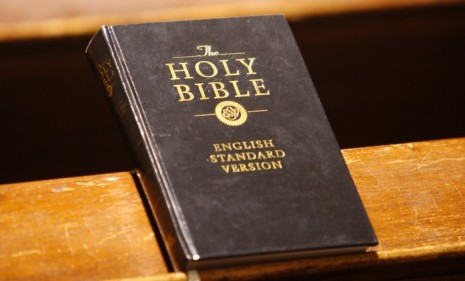Religious IQ: Why do atheists outscore Christians?
A new Pew survey shows that atheists, Jews, and Mormons know more about religion than Catholics and Protestants. Should Christians be worried?

A free daily email with the biggest news stories of the day – and the best features from TheWeek.com
You are now subscribed
Your newsletter sign-up was successful
"The United States is a nation of religious illiterates," says Boston University professor Stephen Prothero, whose research on Americans' spiritual ignorance inspired a new study that has religion teachers and ministers aghast. A significant number of Christians don't know the basics about their own professed faith or other major religions, according to the Pew Forum on Religion & Public Life survey, while atheists and agnostics have the highest "Religious IQ," correctly answering 20.9 questions in the study's 32-question quiz. (Take a short version of the quiz.) What's going on in America's pews? (Watch a CNN discussion about the study)
Just how badly did Christians perform?
It depends on the denomination, but no group beat the atheists/agnostics. While Jews (20.5 correct answers) and Mormons (20.3) came in second and third, white evangelical Protestants trailed with a score of 17.6, followed by white Catholics (16.0), white mainline Protestants (15.8), black Protestants (13.4), and Hispanic Catholics (11.6). "We have a weird kind of Christianity in America if Christians don't even know what Christianity is," says Prothero.
The Week
Escape your echo chamber. Get the facts behind the news, plus analysis from multiple perspectives.

Sign up for The Week's Free Newsletters
From our morning news briefing to a weekly Good News Newsletter, get the best of The Week delivered directly to your inbox.
From our morning news briefing to a weekly Good News Newsletter, get the best of The Week delivered directly to your inbox.
What's the theory behind the atheists' high performance?
Pew's Alan Cooperman suggests that atheists tend to grow up in a religion, then consciously give it up after much thought and research. Methodist minister Adam Hamilton factors what he calls Christians' lack of introspection and curiosity into their relatively low scores: "They accept their particular faith... to be true and they stop examining it," he says, and, in turn, don't bother examining other people's beliefs. "That, I think, is not healthy for a person of any faith."
Still, do atheists actually know more about Christianity than Christians?
No. Mormons scored the highest on questions specifically about Christianity, white evangelicals came in second. Both Atheists and Jews racked up points on questions about Buddhism, Islam, Hinduism, and Judaism.
A free daily email with the biggest news stories of the day – and the best features from TheWeek.com
What was the easiest question?
Eighty-nine percent of respondents knew that public school teachers can't lead prayer in the classroom under Supreme Court precedent. But only 36 percent correctly answered the follow-up question, which focused on the issue of teaching the Bible as an example of literature.
What seemed to be the hardest question?
Only 8 percent of total respondents knew that Maimonides, the influential medieval theologian and rabbi, was Jewish. (Only 57 percent of Jewish quiz-takers knew the answer.)
What didn't people know about their own religions?
Forty-five percent of Catholics didn't know that the church believes communion wafers and wine become the actual body and blood of Christ during Mass, and 42 percent couldn't name Genesis as the first book of the Bible. Only 47 percent of Protestants could identify Martin Luther as the writer who sparked the Protestant Reformation.
Does this ignorance really matter?
Yes, argues Prothero, it is a "civic problem of the first order." People make many decisions based on their faith or religious leaders, and if we don't understand the basis of other faiths (or our own), "we cannot make sense of the world." He says the cure for our "national epidemic of religious illiteracy" is "mandatory public school courses on the Bible and the world's religions." Hold on, aren't we reading a bit much into this one study, asks Clarence Page in the Chicago Tribune. It's likely that quite a few respondents who grew up in the black Protestant tradition, for example, "thought 'Martin Luther' was a reference to a great American civil rights leader, not the German priest and professor," he says. At least in some cases, "the pollsters were asking the wrong questions."
Sources: LA Times, AP, Chicago Tribune, Pittsburgh Post-Gazette, New York Times, USA Today, Milwaukee Journal Sentinel, CNN